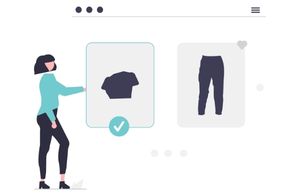Or go to our Shopify Theme Detector directly
How Long Has Dropshipping Been Around?
Last modified: April 24, 2024

While it is a popular myth that dropshipping was born thanks to the internet, it could surprise you to know that dropshipping has been around for a lot longer. In this article, we explore this and take you from the early beginnings to the modern-day dropshipping on Shopify. So, how long has dropshipping been around?
| # | Name | Image | |
|---|---|---|---|
| 1 |

|
AutoDS
|
|
| 2 |
|
Spocket-World Wide Suppliers
|
|
| 3 |

|
Syncee - Global Dropshipping
|
|
| 4 |

|
Printful-Sell Printed and Embroidered Items
|
|
| 5 |

|
Sup Dropshipping
|
|
| 6 |

|
DSers-AliExpress Dropshipping
|
|
| 7 |

|
Zendrop - Dropshipping & POD
|
|
| 8 |

|
Dropshipman: Dropshipping & POD
|
|
| 9 |

|
AO - AliExpress Dropshipping by FireApps
|
|
| 10 |

|
Trendsi - Fashion Dropshipping
|
|
| 11 |

|
CJdropshipping
|
|
| 12 |

|
DropCommerce
|
|
| 13 |

|
Modalyst-Sell Brand Name Products
|
|
| 14 |

|
Ali Orders-Fulfill Orders Easily
|
|
| 15 |

|
Blanka - Private Label Beauty
|
|
| 16 |

|
Dropified-Automate Your Dropshipping Business
|
|
| 17 |

|
ProductPro
|
|
| 18 |

|
Spreadr App
|
|
| 19 |

|
Importify
|
|
| 20 |

|
Inventory Source
|
|
| 21 |

|
Roxie
|
|
| 22 |

|
Fulfillbot: Dropshipping Agent
|
|
| 23 |

|
KakaClo
|
|
| 24 |

|
Oberlo-Get the Best Produtcts for Your Site
|
|
|
Show More
|
|||
The Beginnings of Dropshipping
It is very difficult to find the exact moment that dropshipping started. Part of the process of dropshipping is not making the customer aware of the third-party supplier in some context. This allows the brand to manage the transaction and not lose the customer to the actual supplier, who might offer the same product at a lower cost.
However, it is generally considered that dropshipping started in the 1960s, long before computers and e-commerce were commonplace in the home. Instead, dropshipping started with mail-order catalogs.
What started was large branded department stores sending out catalogs to customers, who can then place orders via mail or over the telephone. One of the employees would then pick the items off the shelf and deliver the products to the customer. It was a simple, effective process, but it had one drawback, it was so popular that department store shelves were being emptied and this was bad as it gave a negative impression to customers walking in.
So they had to come up with a solution, and that was fulfillment warehouses. These massive warehouses were designed to store large quantities of produces and speed up the mail-order process.
And this is when dropshipping started to take off.
The First Dropshipping Exploits
This is when entrepreneurs saw an opportunity to make money. What they would do is create their own mail-order catalog with the products from the department stores. They would have prices higher than the department store, and then they would distribute their catalog. When they got an order from a customer, they would order from the department store and then deliver it to the customer.
The problem was that the larger department stores weren’t aware of what was going on, not in the beginning. But this also isn’t the exact model that is recognized today. It has taken some time to get that. And that did require the internet. And whether to pay upfront for dropshipping services became a crucial consideration in the evolution of this model.
How the Internet Changed Dropshipping
When the internet came about, businesses saw the opportunity to transition to this new medium. It was the perfect way to sell. However, consumers were slower on the take-up. Many consumers felt it was risky to provide card details to someone on the internet, and it was much safer to give them to someone over the phone. Nowadays, ironically, the opposite is said. Amidst the evolving landscape of e-commerce, the ability to dropship directly from your phone has emerged as a convenient option for entrepreneurs seeking flexibility and mobility in managing their businesses.
However, dropshipping wasn’t a complete success. During the 90s there were many new dropshipping businesses online, but while customers started to come around, many were not sustainable and they closed.
In the early days of e-commerce, setting up a dropshipping website was seen as a novel approach to online retail, yet its success was not guaranteed, leading to the closure of numerous ventures.
The Growth of Dropshipping as a Sustainable Business
However, since then the technology has improved. Amazon and eBay showed how e-commerce could work, and then Shopify has developed their software and programming. This allowed for new technology, secure connections and better access to it. And consumers became more trusting.
Therefore, dropshipping became more accessible to the general person and with better globalization, costs for all could be realized. Therefore, dropshipping was finally mainstream.
Evolution of Dropshipping
Early Beginnings
Dropshipping, as a business concept, traces its origins back to the 1960s, when it first emerged in the context of mail-order catalogs. During this era, established retailers and large stores began utilizing these catalogs.
Internet Era and E-commerce
The pivotal turning point for dropshipping arrived in the 1990s with the advent of the internet. Companies that had previously relied on traditional mail-order methods transitioned to the digital landscape.
Modern Dropshipping Landscape
The evolution of dropshipping reached the rise of e-commerce giants that transformed the landscape. These influential platforms provided a great opportunity for dropshipping.
Dropshipping’s Growth and Future
Shopify’s Impact
The pivotal moment in the evolution of e-commerce came with the launch of Shopify in 2004. This innovative platform revolutionized the way entrepreneurs and businesses created and managed their online stores.
Current Trends and Opportunities
Dropshipping continues to evolve dynamically, driven by a continuous influx of new suppliers and transformative technologies. This dynamic ecosystem offers an array of opportunities for entrepreneurs.
Future Outlook
The future of dropshipping holds considerable promise, underpinned by the march of technological advancements and the growth of e-commerce platforms. These factors are shaping the trajectory of dropshipping.
Conclusion: How Long Has Dropshipping Been Around?
How long has dropshipping been around? Well, the first dropshipping businesses were around in the 1960s, but it has really only been in the last 10–15 years that we would recognize dropshipping in the form that it is now.
Keep on reading about Dropshipping on Shopify. For example Do You Pay Tax on Dropshipping? and How Many Products Should I Start with Dropshipping?. Both part of our Shopify Dropshipping Apps and Shopify Dropshipping Themes lists. You can read more about Dropshipping on Shopify with our ultimate Dropshipping on Shopify guide.
-
Why did many early online dropshipping businesses fail?
Early online dropshipping businesses often failed due to challenges such as limited e-commerce infrastructure, unreliable suppliers, marketing difficulties, fierce competition, and insufficient business strategies.
-
How has the target market for dropshipping changed since its inception?
The target market for dropshipping has evolved, diversifying from budget-conscious shoppers to include niche markets, quality-focused consumers, and those seeking eco-friendly and ethical products.
-
How did the evolution of payment methods impact dropshipping?
The evolution of payment methods enhanced dropshipping by providing secure and convenient transactions, fostering consumer trust, and enabling global expansion by accommodating diverse payment preferences.




 PageFly Landing Page Builder
PageFly Landing Page Builder  Shopify
Shopify  SEMrush
SEMrush  Website Maintenance
Website Maintenance  UpPromote
UpPromote